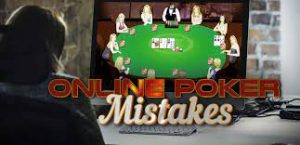
You think you have to act before your opponent.
You are correct, sometimes you do, however, not all of the time. Hitting your set and chasing your draws is a common trend at the poker table. It can also turn disastrous if you are not patient.
Calling and chasing your draws is a favorite exploit used by inexperienced poker players. They rarely succeed in their ventures outside of the hand, and when they do, they get very embarrassed. The flush draw, unlike the straight draw, is a hand that can bearer along, no matter the cards. Chances are your flush draw will get there, and you will not getature new life if you do not learn patience.
The PS, however kind of misses the target. It is not a play-like or misleading method, just kind of a sneaky approach, kind of a Jokerish grin-smile disclaimer.
Observe the following hand where a guy calls his flop bet only to turn his hand into a monster on the turn.
– Is there a bigger or similar hand to the one he just called? If so, maybe he was on a draw and missed. Maybe he had top pair, bottom pair, or maybe he had A-A and missed.
– Does he bet again on the turn? If so, he could be on a draw and not get discouraged, since he has invested only one more bet in the pot.
– Does he slow play at the end? If so, he is not trying to make a move, he is waiting for a stronger hand. Why? Because most players, even if they are skilled, will only call you up to a straight, otherwise they know they are beat.
Take a closer look at all of the above questions, and you will find, it is far more common to call you in the turn, than you will be called in the river. The average river call is 6% of the pot size. The turn call is 11%, and the average bet called on the river is 17% of the pot size. The result is that at this level of play for inexperienced players, they can afford to call more often than they will actually be called, providing they feel no pressure. They will not be called in the turn or river very often, so they will have enough chips to trade with a better hand when they do get called.
Here is a broad way of looking at implied odds. When you call a bet, you assume the odds of your opponent hitting the card you want are about 11:1. Then, implied odds is the amount you would get paid if, in your hand, you did hit, plus the amount you would be willing to pay him if you did not hit and he calls. You can add to this an amount you think his call would be profitable for you to call, say $5. The result is that implied odds is how much money you would make if you hit your hand in the long run, the amount you would be willing to lose if your opponent hits.
You can calculate implied odds by first taking the size of the bet your opponent would have to call, and then subtracting it from the size of the bet you will make if you hit your hand. implied odds are then the ratio of the two sizes of the bet. Obviously, implied odds are smaller than your pot odds, since you are betting a lot more chips to stay in the game. And, implied odds are negative when your opponent calls, since your implied odds are bigger.
You can think of implied odds as the odds you would win if you had the best hand, without actually having the best hand. That’s a common way to think of it.
You might want to keep in mind that implied odds are between you and your opponent, and not the other way around. If you had a great draw and had a gutshot straight, you could call a bet on the flop even though you have not made your hand yet. You haven’t even made your hand yet, so it’s not even a good bet yet. Once you make your hand, you will be able to make a better bet on the turn. In implied odds, you are always counting on the fact that your opponent is making a better hand, or a hand better than yours.
You also want to be aware of implied odds if you are playing a bigger field. Let’s say that you live in a very popular cardroom, and you’ve been playing Dewatogel for a while. You’ve been making a constant profit, at a slow but steady pace. One day, you get nice pocket cards. You are thinking about betting them to get a raise when you see a friend betting a big stack. You call your friend and almost double the blind. Before you throw them both out, you look down to see two red cards.